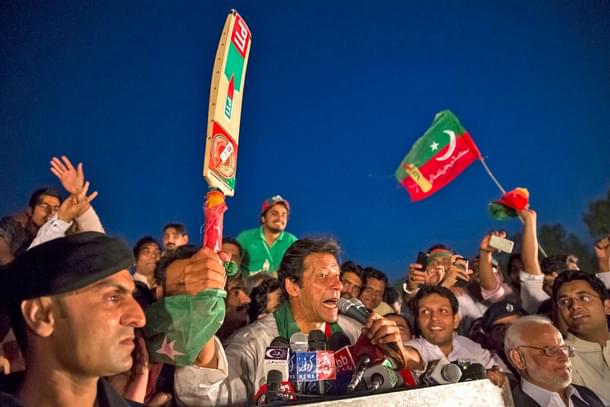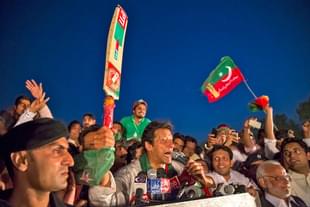World
What To Make Of The Assassination Attempt And Chaos In Pakistan?
Swarajya Staff
Nov 05, 2022, 03:48 PM | Updated Nov 06, 2022, 11:35 PM IST
Save & read from anywhere!
Bookmark stories for easy access on any device or the Swarajya app.


Pakistan has witnessed assasination of two of its PMs and judicial murder of one.
The assasination of Pakistan's first PM Liaqat Ali Khan at the East India Company bagh in Rawalpindi, the assasination of Benazir Bhutto in the same East India Company bagh and the judicial murder of her father Zulfikar Ali Bhutto.
Now, there has been an assasination attempt on the nation's former PM - Imran Khan Niazi. He crossed taboos of Pakistan's polity that few others have, by directly accusing the army.
He was attacked in the city of Wazirabad, where he was carrying out his 'long march', to protest against his disqualification from Pakistan's legislative assembly. Niazi reportedly suffered a bullet injury to his right leg.
The former PM and the chairman of the Pakistan Tehreek-e-Insaf party believes that the Prime Minister Shehbaz Sharif, Interior Minister Rana Sanaullah and Major General Faisal Naseer aka 'dirty harry' are part of a sinister plot to assassinate him in the same way Salman Taseer, former governor of Punjab, was killed in 2011 by a religious extremist.
Major General Faisal Naseer is Director General (C) ISI. Ironically enough, he was apparently nominated as the DG (C) of ISI by Imran Khan only.
Major General Faisal Naseer, contrary to claims made by some reports, actually enjoys the support of Army Chief Gen Qamar Bajwa. People familiar with Pakistan have disclosed that General Bajwa has ordered those concerned that they should not dare to name Major General Faisal Naseer in the police FIR, adding that they are free to name the Prime Minister and Interior minister.
Punjab Chief Minister Pervaiz Elahi has reportedly told the former PM that he cannot include Major General Faisal Naseer's name in the FIR.
"The baseless allegations hurled at the institution/officials today are highly regrettable and strongly condemned. No one will be allowed to defame the institution or its soldiers with impunity. Keeping this in view, the government of Pakistan has been requested to investigate the matter and initiate legal action against those responsible for defamation and false accusations against the institution and its officials without any evidence whatsoever" said the Pakistan military's media wing Inter-Services Public Relations (ISPR), refuting the former prime minister's claims.
"ISPR took nearly 1 hour to complete an inquiry on major general Faisal Naseer. That was quick. Very professional indeed. Such jokes are REJECTED #SackGeneralFaisal," said Hassan Niazi, focal person to Imran Khan Niazi.
People protesting in support of the former PM were reportedly welcomed by battle tanks in Lahore.
In his address from the hospital, the former PM said, "4 people in a closed room decided to get me killed, and I went on TV and said this to the people. I made a video, named those four people, and kept it, saying that if something happens to me, the video would be released. I did that because if I had died, the country would know who killed me".
"People come and tell me on their own about their conspiracies against me. And what was the conspiracy? These people decided to first prove that I insulted the religion and released a few tapes to create a narrative. I already knew who those people were. In today's generation, it is so easy to get to know everything, as it is the digital world" he added.
The Pakistani army and the society from which the civilian government emerges, both hate India or to be more precise, they hate assertive Hinduism.
Who rules Pakistan makes little difference to what the nation's policies towards India will be. People don't dictate foreign policy, national interest does. For the cohesion and unity of Pakistan as a nation, hatred and resentment towards assertive Hinduism is necessary as that is the only binding factor and in essence the rationale behind the state.
Even though who rules Pakistan makes little difference to the equation of power in the subcontinent, it is an interesting phenomenon. The struggle between the army and the civilian government can be traced back to the day when Pakistan was created.
On August 14, 1947, Mohammed Ali Jinnah told an officer, "It is we, the people’s representatives who decide how the country is to run. Your job is only to obey the decision of your civilian masters” and by 1951, Ayub Khan was saying, “This army has a much greater and wider role to play than people realise. The C-in-C, in fact, is a more important man than the prime minister in our country as the situation stands.” Army has often chosen who 'rules' Pakistan and has just as often removed them from power when they become a source of irritation.
It is a structurally incoherent and unstable nation, an aberration.





